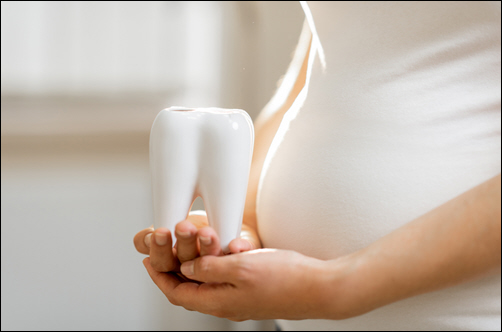Maintaining good oral health during pregnancy is crucial for both the mother and the developing baby. Pregnancy triggers hormonal changes that can impact your gums and teeth, increasing the risk of conditions like gum disease and cavities. By prioritizing oral health during this time, you protect your well-being and support a healthier pregnancy. Here’s why dental care during pregnancy matters, and what you should consider to keep your smile strong and healthy.
Why Oral Health Matters During Pregnancy
 Hormonal shifts during pregnancy can make gums more sensitive, often causing inflammation and increasing susceptibility to plaque buildup. Many women experience pregnancy gingivitis, a mild form of gum disease characterized by red, swollen, or bleeding gums. Left untreated, gingivitis can progress to periodontitis, a more severe form of gum disease that may increase the risk of preterm birth and low birth weight.
Hormonal shifts during pregnancy can make gums more sensitive, often causing inflammation and increasing susceptibility to plaque buildup. Many women experience pregnancy gingivitis, a mild form of gum disease characterized by red, swollen, or bleeding gums. Left untreated, gingivitis can progress to periodontitis, a more severe form of gum disease that may increase the risk of preterm birth and low birth weight.
Additionally, pregnancy can increase the risk of tooth decay due to morning sickness or cravings for sugary snacks. Vomiting exposes teeth to stomach acid, which weakens enamel, while frequent snacking increases exposure to cavity-causing bacteria. Maintaining good oral hygiene and regular dental checkups can help manage these risks and prevent complications.
Key Considerations for Dental Care
While pregnancy doesn’t restrict you from necessary dental care, there are important considerations to keep in mind to ensure a safe, comfortable experience. Here’s what to know:
- Inform Your Dentist: Let your dentist know you’re pregnant, as this will guide them in making any necessary adjustments to your treatment plan. Certain treatments, like x-rays, can be modified or postponed if needed. Modern digital x-rays emit minimal radiation, but dentists often recommend using extra shielding, especially in the first trimester, to ensure safety.
- Schedule a Dental Check-Up: If possible, schedule a check-up early in your pregnancy. Regular cleanings and exams are safe and can help prevent or address issues before they become serious. The second trimester is typically the ideal time for any necessary dental work, as this period is often more comfortable for most women.
- Watch for Signs of Gum Disease: Pregnancy gingivitis is common, so monitor your gums for signs of redness, swelling, or bleeding, especially while brushing or flossing. If you notice these symptoms, let your dentist know so they can recommend treatments to manage inflammation and prevent progression.
- Stick to Good Oral Hygiene Habits: Brush twice daily with fluoride toothpaste, floss daily, and rinse your mouth with water after any episodes of morning sickness to reduce acid impact on teeth. You may also consider a fluoride mouthwash to strengthen enamel.
- Choose Nutritious Foods: A balanced diet supports both your oral health and your baby’s development. Opt for calcium-rich foods to keep teeth strong, and avoid sugary or acidic foods that can increase the risk of decay.
Prioritizing Oral Health for a Healthier Pregnancy
By maintaining good oral health during pregnancy, you protect your smile and reduce risks for your baby. Regular dental check-ups, attentive oral hygiene, and a nutritious diet all contribute to a healthier pregnancy journey. If you have concerns about your dental health or treatment options while pregnant, consult your dentist—they’ll provide guidance to keep you and your baby safe and healthy.

